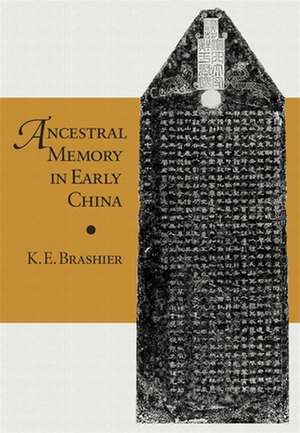Ancestral Memory in Early China: Harvard-Yenching Institute Monograph Series
Autor K. E. Brashieren Limba Engleză Hardback – 9 mai 2011
This study is a history of the early Chinese ancestral cult, particularly its cognitive aspects. Its goals are to excavate the cult's color and vitality and to quell assumptions that it was no more than a simplistic and uninspired exchange of food for longevity, of prayers for prosperity. Ancestor worship was not, the author contends, merely mechanical and thoughtless. Rather, it was an idea system that aroused serious debates about the nature of postmortem existence, served as the religious backbone to Confucianism, and may even have been the forerunner of Daoist and Buddhist meditation practices.
Din seria Harvard-Yenching Institute Monograph Series
-
 Preț: 315.24 lei
Preț: 315.24 lei -
 Preț: 445.58 lei
Preț: 445.58 lei -
 Preț: 306.36 lei
Preț: 306.36 lei - 13%
 Preț: 343.28 lei
Preț: 343.28 lei -
 Preț: 392.49 lei
Preț: 392.49 lei - 13%
 Preț: 396.59 lei
Preț: 396.59 lei -
 Preț: 373.11 lei
Preț: 373.11 lei -
 Preț: 214.28 lei
Preț: 214.28 lei -
 Preț: 328.42 lei
Preț: 328.42 lei -
 Preț: 307.45 lei
Preț: 307.45 lei -
 Preț: 328.67 lei
Preț: 328.67 lei - 13%
 Preț: 369.36 lei
Preț: 369.36 lei - 13%
 Preț: 357.27 lei
Preț: 357.27 lei -
 Preț: 403.65 lei
Preț: 403.65 lei - 13%
 Preț: 395.01 lei
Preț: 395.01 lei -
 Preț: 248.96 lei
Preț: 248.96 lei -
 Preț: 492.08 lei
Preț: 492.08 lei -
 Preț: 368.09 lei
Preț: 368.09 lei -
 Preț: 210.65 lei
Preț: 210.65 lei -
 Preț: 362.10 lei
Preț: 362.10 lei -
 Preț: 206.40 lei
Preț: 206.40 lei - 19%
 Preț: 298.49 lei
Preț: 298.49 lei - 22%
 Preț: 149.32 lei
Preț: 149.32 lei - 25%
 Preț: 200.74 lei
Preț: 200.74 lei - 18%
 Preț: 256.41 lei
Preț: 256.41 lei - 25%
 Preț: 233.31 lei
Preț: 233.31 lei - 27%
 Preț: 184.00 lei
Preț: 184.00 lei - 18%
 Preț: 253.66 lei
Preț: 253.66 lei - 22%
 Preț: 221.51 lei
Preț: 221.51 lei - 28%
 Preț: 181.32 lei
Preț: 181.32 lei - 28%
 Preț: 186.67 lei
Preț: 186.67 lei - 24%
 Preț: 213.59 lei
Preț: 213.59 lei - 24%
 Preț: 236.27 lei
Preț: 236.27 lei - 28%
 Preț: 183.09 lei
Preț: 183.09 lei -
 Preț: 141.70 lei
Preț: 141.70 lei - 18%
 Preț: 254.58 lei
Preț: 254.58 lei - 28%
 Preț: 183.09 lei
Preț: 183.09 lei - 25%
 Preț: 234.23 lei
Preț: 234.23 lei - 18%
 Preț: 254.58 lei
Preț: 254.58 lei - 18%
 Preț: 304.22 lei
Preț: 304.22 lei - 24%
 Preț: 237.01 lei
Preț: 237.01 lei - 31%
 Preț: 176.00 lei
Preț: 176.00 lei - 23%
 Preț: 257.24 lei
Preț: 257.24 lei - 26%
 Preț: 187.56 lei
Preț: 187.56 lei - 15%
 Preț: 111.96 lei
Preț: 111.96 lei - 26%
 Preț: 230.56 lei
Preț: 230.56 lei - 24%
 Preț: 237.88 lei
Preț: 237.88 lei - 25%
 Preț: 232.38 lei
Preț: 232.38 lei
Preț: 240.65 lei
Preț vechi: 313.19 lei
-23% Nou
Puncte Express: 361
Preț estimativ în valută:
46.05€ • 49.24$ • 38.39£
46.05€ • 49.24$ • 38.39£
Carte indisponibilă temporar
Doresc să fiu notificat când acest titlu va fi disponibil:
Se trimite...
Preluare comenzi: 021 569.72.76
Specificații
ISBN-13: 9780674056077
ISBN-10: 0674056078
Pagini: 350
Dimensiuni: 162 x 236 x 36 mm
Greutate: 0.82 kg
Editura: Harvard University Press
Seria Harvard-Yenching Institute Monograph Series
ISBN-10: 0674056078
Pagini: 350
Dimensiuni: 162 x 236 x 36 mm
Greutate: 0.82 kg
Editura: Harvard University Press
Seria Harvard-Yenching Institute Monograph Series
Descriere
An history of the early Chinese ancestral cult, particularly its cognitive aspects. It intends to excavate the cult's color and vitality and to quell assumptions that it was no more than a simplistic and uninspired exchange of food for longevity, of prayers for prosperity.
